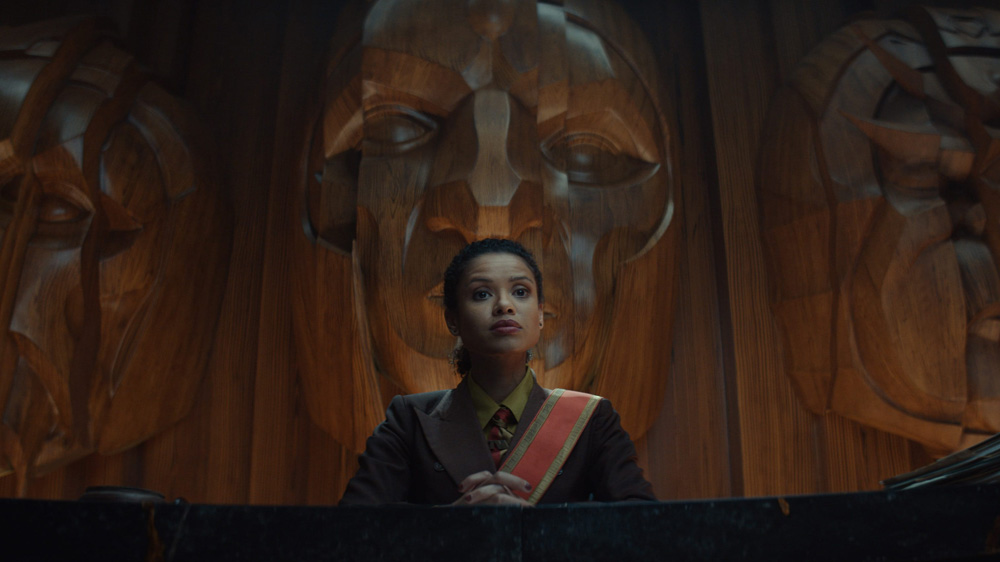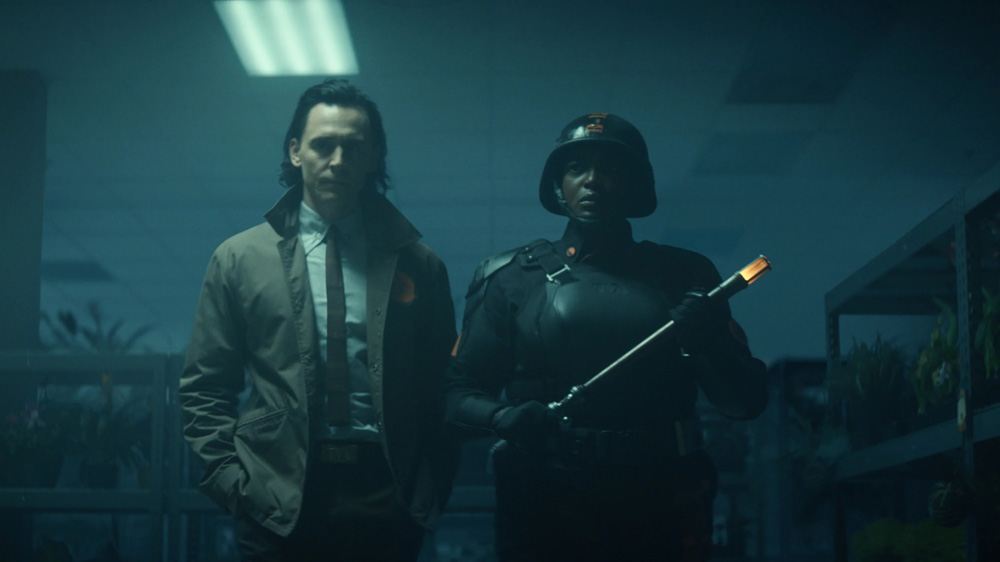
Since everyone’s dying to know about Loki, let’s cut to the chase: Loki is a fun, weird, occasionally awkward shift away from the Marvel cinematic aesthetic that gives one of its central and most popular players room to be both exactly what we expect him to be and also the space to be something more than we’ve seen. Did that make sense? We’ll try to unpack this with as few spoilers as possible.
Unlike WandaVision and The Falcon and the Winter Soldier, the two Disney+ MCU series that preceded it, Loki isn’t necessarily about giving a formerly sidelined or under-utilized character some room to tell their story and come into their own. If anything, Loki may be the most popular MCU character without a film to his name; having not only appeared in six different MCU films, but as one of the most important characters in the entire franchise universe. Tom Hiddleston has not suffered from a lack of screen time in the MCU, nor could anyone rightly say his character is underexplored or under-utilized. On the contrary, he has one of the most well-defined and satisfying character arcs in the MCU, traveling as he did from loathed villain to loved brother/son and colleague before sacrificing his life; an action at the end of his cinematic journey that would have seemed impossible to consider at the start of it.
But when you have magic stones and time travel in your storytelling arsenal, you can do just about anything with your characters, even give them the space to grow and change well after you’ve depicted their death. The Loki at the start of Loki is very much not the Loki who helped Thor defend Asgard in Thor: Ragnarok and died trying to protect the Asgardians from Thanos in Avengers: Infinity War. Instead (and as depicted in the time-traveling shenanigans of Avengers: Endgame), he’s the Loki who just suffered his first massive defeat as seen at the end of the first Avengers film. He is angry, pompous, frustrated and completely lacking in any of the growth the character went through. This Loki’s parents are still alive and his Asgard still exists, along with his hatred for his brother and his brother’s co-workers. This Loki still has the wounds he suffered when Hulk ragdoll’d him all over Tony Stark’s penthouse and still believes he was born for glorious purpose. This might seem like an enormous reset for a character who seemed to have no more stories to tell, but if you’re telling the tales of characters from superhero comics, you have to know: there are always more stories to tell, even with dead characters.

But Loki, fortunately, feels like more than just an attempt to keep the intellectual property party going on a popular character. This is Disney, home of Cruella and Maleficent, so of course it is that, but credit should be paid to writer Michael Waldron and director Kate Herron for devising a true wild left turn for the character, putting him in a state that feels fresh after so many hours of screen time: a complete inability to predict or assume what he’ll do next. Anchored by Hiddleston’s droll and occasionally nasty Loki and his somewhat brilliant pairing with the equally droll Owen Wilson (who turned into John Slattery when no one was paying attention, evidently), Loki is a Brutalist, mid-Century shift away from the MCU aesthetic, with story and visual elements that call to mind Terry Gilliam’s Brazil, The Hitchhiker’s Guide to the Galaxy, Doctor Who (especially the seventies era), 2001: A Space Odyssey and even The Good Place. If the first few episodes of WandaVision were a tribute to classic television, then Loki, with its central setting of a stultifying cosmic bureaucracy in unusually grandiose surroundings, more than serves as a surprisingly adept tribute to a range of science fiction classics.
If you’ve seen the trailer, you know the setup: After escaping the Avengers (and his own fate), Loki is picked up by agents from the Time Variance Authority, a cosmic bureaucracy that keeps the “sacred timeline” pure and prevents a multiverse from forming by dealing with “variants,” beings who managed to create an alternate timeline. And when we say “dealing with,” we mean it in the most final manner possible. Things aren’t looking good for our god of mischief until Owen Wilson’s Agent Mobius steps in and deputizes him to help him with a time stream issue of particular interest to the Asgardian. We won’t say more than that, except to note that in the first several episodes, Loki fans who can’t wait to see him at his full glorious-purpose powers may be a little disappointed at the relentless humiliation he suffers. We have no doubt Loki will turn the tables at some point (we would be disappointed if the god of mischief didn’t get the opportunity to strut his stuff in this tale) and that much of what we’re seeing is only half the story. In fact, it feels like hints or ominously meaningful statements were being dropped every couple of minutes in the first episode. We’re wary of hoping for too much in the way of twists and turns, given how straightforward both WandaVision and The Falcon and the Winter Soldier turned out to be, but we can’t imagine the point of this tale is to humiliate Tom Hiddleston as much as possible. Having said that, the first punch to the face he takes is one of the most hilarious things we’ve ever seen visited upon any Marvel character.
“It is adorable that you think you can manipulate me” he tells the smarmy Agent Mobius at one point, but it’s very clear that he can and that the TVA is, as Loki finally admits with a defeated look that makes him appear smaller and less significant than at any time in his existence, “the most powerful force in the universe.” Still, we find ourselves absolutely hungry for the chance to see the god of mischief do what he does best. We already saw Loki’s comeuppance in the films. The humiliation and tearing down of the character in the first few episodes is necessary because we’re dealing with him before he softened and became a kinder god. This story’s only going to work if Loki gets to be Loki Triumphant by the end and we suspect that, like WandaVision’s early episodes, this series is going to require a little patience before it gives us what we want.

There’s something that felt a little lacking in the first two episodes and for want of a better, more precise term, we’re going to call it “energy.” The problem with setting your adventure story in a parody of a bureaucracy of massive proportions is that there are probably a bit too many scenes of people walking down hallways, sitting at desks (or cafeteria tables) and looking at files. The art direction is impressively atmospheric, but the atmosphere is deliberately oppressive. There’s no doubt in our minds that the series is going somewhere (and the end of episode 2 promises a major shift in focus), but these first two episodes are like wandering the largest office building in the universe – quite literally. There also seems to be something of a pacing issue. The sequence of Loki avoiding Wunmi Mosaku’s TVA Agent seemed to go on several minutes longer than it needed to and it’s not the only scene that feels that way. There’s a need to perhaps overexplain or re-assert points in these early installments too. Maybe we’re jaded from a lifetime of devouring this sort of story, but the TVA and alternate timelines don’t actually require as much explaining as the series seems to think. If you’re coming to Loki with a decent bit of MCU-watching experience under your belt (And really, who isn’t at this point?), much of the table-setting in the beginning might seem a little unnecessary.
But there’s no denying that the overly meticulous setup is intriguing and that everyone’s favorite mischief god is on course to fully unleash his petulant rage as soon as he gets a chance. That’s the moment we’re waiting for and Loki has done a delicious job of making us want it.
[Photo Credit: Courtesy of Marvel Studios]
Colman Domingo Promotes “Zola” in Dolce & Gabbana Next Post:
“Shrill” and “SNL” Star Aidy Bryant Wears The Vampire’s Wife for Jimmy Kimmel Live
Please review our Community Guidelines before posting a comment. Thank you!



